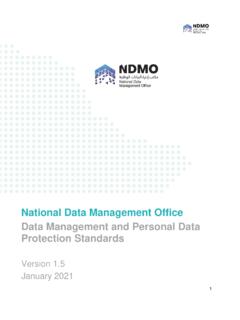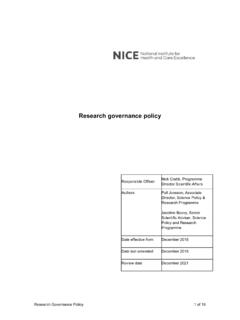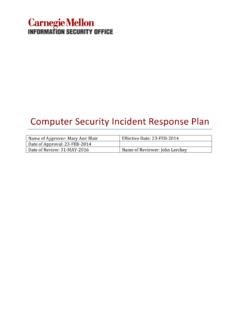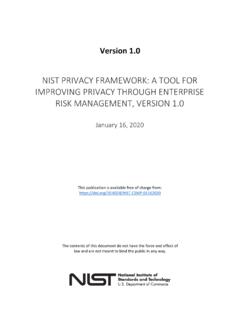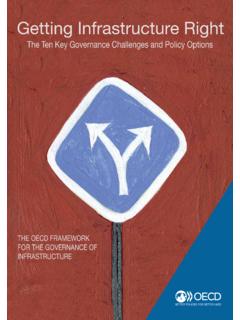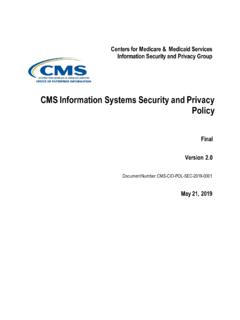Transcription of و ةيساسالأ ئدابلما - SDAIA
1 national data governance Interim Regulations Version 1 June 1st, 2020 " " national data governance Interim Regulations 2 Table of Content 1. Introduction .. 5 2. Definitions .. 7 3. Objectives .. 12 4. data Classification Interim Regulations .. 15 Scope .. 15 Key Principles .. 15 Principle 1: Open by 15 Principle 2: Classification Based on Necessity .. 15 Principle 3: Timely Classification .. 15 Principle 4: Highest Level of Protection .. 15 Principle 5: Segregation of Duties .. 15 Principle 6: Need to Know.
2 15 Principle 7: Least Privilege .. 15 data Classification Levels .. 16 data Classification Controls .. 21 Protective Marking .. 21 Access .. 21 Usage .. 21 Storage .. 22 data Sharing .. 22 Retention .. 22 Disposal .. 22 data Classification Process .. 23 Roles and Responsibilities Within the Entity .. 27 5. Personal data Protection Interim Regulations .. 29 Scope .. 29 Key Principles .. 29 Principle 1: Accountability .. 29 Principle 2: Transparency .. 29 Principle 3: Choice and Consent .. 29 Principle 4: Limiting data Collection .. 29 Principle 5: Use, Retention and 29 Principle 6: Access to data .
3 29 Principle 7: data Disclosure Limitation .. 30 Principle 8: data Security .. 30 national data governance Interim Regulations 3 Principle 9: data Quality .. 30 Principle 10: Monitoring and Compliance .. 30 data Subject Rights .. 30 data Controller Obligations .. 30 General Dispositions .. 33 6. data Sharing Interim Regulations .. 35 Scope .. 35 Key Principles .. 35 Principle 1: data Sharing Culture .. 35 Principle 2: Clear Purpose for data Sharing .. 35 Principle 3: Authorized Access .. 35 Principle 4: Transparency .. 35 Principle 5: Collective Accountability .. 35 Principle 6: data Security.
4 36 Principle 7: Ethical data Use .. 36 data Sharing Process .. 36 data Sharing Timeline .. 37 data Sharing 38 Legal Basis: .. 38 Authorization .. 38 data Type .. 38 data Preprocessing .. 38 Means of data Sharing .. 39 data Usage and Safeguarding .. 39 data Sharing Duration, Frequency and Termination .. 39 Liability Provisions .. 40 General Rules and Obligations .. 40 7. Freedom of Information Interim Regulations .. 43 Scope .. 43 Key Principles .. 43 Principle 1: Transparency .. 43 Principle 2: Accountability and Reasonable Justification .. 43 Principle 3: Public Information Disclosure.
5 43 Principle 4: Equality .. 44 The Rights of Individuals to Access Public Information .. 44 national data governance Interim Regulations 4 Obligations of Public Entities .. 44 Request for Information Process .. 45 General Dispositions .. 47 Freedom of Information and Open data .. 48 8. Open data Interim Regulations .. 50 Scope .. 50 Key Principles .. 50 Principle 1: Open by 50 Principle 2: Open Format and Machine-Readable .. 50 Principle 3: Up to Date .. 50 Principle 4: Comprehensive .. 50 Principle 5: Non-discriminatory .. 50 Principle 6: Free of Charge .. 50 Principle 7: KSA Open data License.
6 50 Principle 8: For Improved governance and Citizen Engagement .. 51 Principle 9: For Inclusive Development and Innovation .. 51 Assessing data Value for Defining Open datasets .. 51 Step 1: Identifying the data and Public Information Inventory .. 51 Step 2: Assessing data Value .. 51 Step 3: Identifying Potential Stakeholders .. 51 Open data Rules and Obligations .. 52 Open data planning .. 52 Open data Identification .. 53 Open data Publishing .. 53 Open data Maintenance .. 53 Open data Performance Tracking .. 54 Roles and Responsibilities .. 54 national Level .. 54 Entity Level.
7 55 Compliance .. 57 national data governance Interim Regulations 5 1. Introduction Government data represents a national asset that can enhance performance and productivity and facilitate public services delivery. This can be achieved by instituting effective data management practices, establishing the highest levels of data accountability and transparency, and leveraging data to extract insights and support strategic decision making. Nations around the world are harnessing the value of data as a vital economic resource for unlocking innovation, driving economic growth and transformation, and improving national competitiveness.
8 Government entities in the Kingdom of Saudi Arabia collect and process vast amounts of data that can contribute to the national economic prosperity and leadership among global data -driven economies. To drive full value realization from national data assets, data sharing is a foundational principle to establish synergies across government entities and avoid data duplication, inconsistencies, and multiple sources in absence of clarity regarding the single source of truth. This requires data classification against defined levels of confidentiality for balancing between the benefits and risks associated with data sharing among entities in the public, private, or third sector.
9 data classification is a pre-requisite for identifying and publishing open data , making publicly classified information available, and exchanging protected data that includes personal data . This increases the level of public scrutiny standards against the performance of public entities, enhances transparency, fosters integrity and removal of unnecessary secrecy on public entities activities, supported by adequate procedures for the right to access public information otherwise known as Freedom of Information. With the technological advancement and ease of access and sharing of data , personal data protection is becoming increasingly more critical which has instigated most countries around the world to release laws and regulations for collecting, processing, and sharing of personal data to protect individuals right to privacy and to govern national data sovereignty.
10 The Kingdom of Saudi Arabia is paving towards a new era under the national Vision 2030, enhancing Government effectiveness and transparency, fostering economic diversification powered by digital and data , playing a larger role in the global economy, founded on public trust and international partnerships. From this standpoint, the national data Management Office (NDMO), as the national regulator of data in the Kingdom, has developed the framework for national data governance to set the policies and regulations required for data classification, data sharing, data privacy, Freedom of Information, open data and others in anticipation of necessary legislation.
